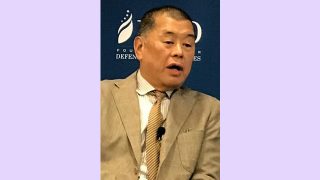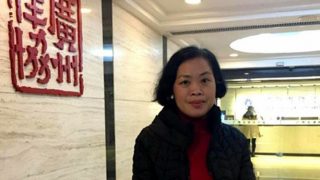China’s top law-making body is expected to pass a sweeping national security law for Hong Kong on Tuesday – a move that many critics and ordinary Hong Kongers fear will empower the Communist Party to tighten its control and threaten the unique status of the freest city on Chinese soil.
In the wake of the yearlong protests in Hong Kong sparked by a controversial extradition bill that could see individuals sent to China for trials, China has repeatedly told Hong Kong leaders to enact legislation to plug the “loophole” of national security. In October, China’s Communist Party leaders unveiled steps to “safeguard national security” in Hong Kong.
In late May, China shocked many by announcing it would impose a sweeping national security law through an annex of the city’s mini-constitution, the Basic Law. China’s top legislative body, the National People’s Congress Standing Committee, has been holding a three-day deliberation on the security law since Sunday. The law is expected to pass on Tuesday.
Although Hong Kong reverted from British to Chinese rule in 1997, its post-handover mini-constitution, the Basic Law, safeguards the city’s basic freedoms and civil liberties, as well as the rule of law, according to the common law tradition.
Human rights and legal experts say the details of the national security law released so far by the Chinese state media contain a series of draconian measures that allow the Chinese authorities the right to exercise jurisdiction “under special circumstances” over what they call “a minority” of national security cases, as well as the power to detain and try suspects.
The national security law, according to the draft law, is also supposed to override Hong Kong legislation “should conflicts arise,” while the power of interpreting the new law is vested in the National People’s Congress Standing Committee.
“The authorities’ assertion that the national security law will only affect a tiny minority is hardly reassuring when the law includes repressive measures that could be used to target literally anyone the government chooses,” said Joshua Rosenzweig, head of Amnesty International’s China section.
Critics say the law would quickly sabotage Hong Kong’s rule of law and its safeguards of civil liberties and human rights — the cornerstones of its success as a bustling Asian financial hub. Some predict this will trigger the city’s quick demise.
They also decry the lack of clear definition over what activities constitute national security crimes and say the power granted to the Chinese security authorities would essentially enable them to take over any case they wish.
According to a summary of the draft, punishment would be handed down for offenses relating to secession, subversion, terrorism and collusion with foreign forces, but no further details have been given so far. On the eve of the law’s expected passage, Hong Kong’s NOW TV reported that the maximum penalty for secession and subversion would be a life sentence.
Ching Cheong, a veteran Hong Kong journalist and political commentator who had been jailed for three years in China, said the national security law is foisting upon Hong Kong the ideology, thinking and behavior patterns of the Communist Party.
“The four crimes — secession, subversion, terrorism, collusion with foreign powers — that the law punishes are determined purely on the ideology of the Chinese Communist Party,” he said. “Under the ‘one-party dictatorship,’ the party and the state are integrated, so criticizing the Communist Party is tantamount to subverting state power.
“But in any normal society, criticizing the ruling party or requesting it to step down should not constitute a crime,” he said.
Also, according to the draft law, Hong Kong will set up a new national security commission headed by its Beijing-appointed top leader, which will be supervised by the Chinese government. China will also establish an agency to analyze the national security situation in Hong Kong and “monitor, supervise, coordinate and support” the local government’s efforts, collect intelligence and handle relevant cases.
Chinese security agents, which it says are required to follow Hong Kong laws, also will be stationed in the city to deal directly with some cases there.
The new law would also grant power to Hong Kong’s top leader to choose judges to handle national security cases in the city — a move criticized by legal experts and rights groups as undermining the principle of the rule of law and impeding the independence of the judiciary.
Hong Kong’s pro-Beijing media has also reported the law would include the establishment of special detention centers where suspects in national security cases can be held indefinitely. Pro-Beijing politicians said individuals who breach the security law could also be extradited to China — where courts have a conviction rate of over 99%.
Other details known so far include the creation of a special police unit to enforce the national security law and a special prosecution unit created by the city’s department of justice for national security crimes. The law also would require the Hong Kong government to strengthen supervision and management of schools and other organizations on matters relating to national security.
Martin Flaherty, a visiting law professor at Princeton University who specializes in human rights issues in China, said he was concerned that the China-designed law would threaten Hong Kong’s judicial independence, traditionally a pride of the former British colony.
“The transferring from one jurisdiction to the other means precisely moving from an independent judiciary to one that is constructed to carry out the wishes of the Party and the government,” he said.
Flaherty, who has researched China, Northern Ireland and Turkey, believes that Beijing “is perhaps ironically imitating the very bad precedent of many Western nations of setting up a separate and draconian judicial system.” But he stressed that such a law would be “much worse” under the Chinese regime because “it lacks the basic forms of constitutional limits, separation of powers, an independent judiciary, and the basic idea that the rule of law should constrain government and the party.”
“The results are there for all to see: the crushing of dissent of any sort, incarceration, torture, trials with preordained results, and the brutal intimidation of lawyers who seek to defend those accused of amorphous laws,” he said of China.
“This type of system is established for the ostensible purpose of national security, but is really designed to get easy convictions,” he said, adding that it would undermine due process protections, target the political opposition, and often end up radicalizing the population.
Source: VOA



